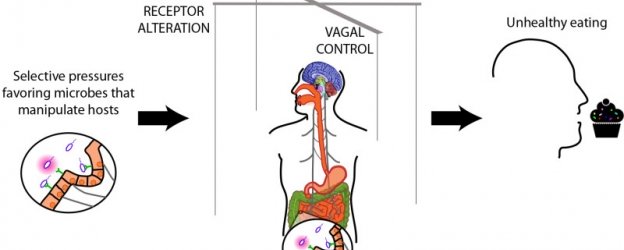Can We Blame our Gut Bacteria for our Food Choices?
26th August 2014

The bacteria within us, which outnumber our own cells about 100-fold, may very well be affecting both our cravings and moods to get us to eat what they want, and may be driving some of us toward obesity.
In an article published last week in the journal BioEssays, researchers concluded from a review of the recent scientific literature that microbes influence human eating behaviour and dietary choices to favour consumption of the particular nutrients they grow best on, rather than simply passively living off whatever nutrients we choose to send their way.
Bacterial species vary in the nutrients they need. Some prefer fat, and others sugar, for instance. But they not only vie with each other for food and to retain a niche within their ecosystem, our digestive tracts, they also often have different aims than we do when it comes to our own actions, according to the authors of the research.
While it is unclear exactly how this occurs, the authors believe this diverse community of microbes, collectively known as the gut microbiome, may influence our decisions by releasing signalling molecules into our gut. The gut is linked to the immune system, the endocrine system and the nervous system, and so those signals could influence our physiologic and behavioral responses.
“Bacteria within the gut are manipulative,” commented the corresponding author on the paper. “There is a diversity of interests represented in the microbiome, some aligned with our own dietary goals, and others not.”
Fortunately, it’s a two-way street. We can influence the compatibility of these microscopic, single-celled houseguests by deliberating altering what we ingest, with measurable changes in the microbiome within 24 hours of diet change.
Research suggests that gut bacteria may be affecting our eating decisions in part by acting through the vagus nerve, which connects 100 million nerve cells from the digestive tract to the base of the brain.
“Microbes have the capacity to manipulate behavior and mood through altering the neural signals in the vagus nerve, changing taste receptors, producing toxins to make us feel bad, and releasing chemical rewards to make us feel good.”
Indeed in mice, certain strains of bacteria increase anxious behavior. In humans, one clinical trial found that drinking a probiotic containing Lactobacillus casei improved mood in those who were feeling the lowest. The authors proposed further research to test the sway microbes hold over us. For example, would transplantation into the gut of the bacteria requiring a nutrient from seaweed lead the human host to eat more seaweed?
The speed with which the microbiome can change may be encouraging to those who seek to improve health by altering microbial populations. This may be accomplished through food and supplement choices, by ingesting specific bacterial species in the form of probiotics, or by killing targeted species with antibiotics. Optimising the balance of power among bacterial species in our gut might allow us to lead less obese and healthier lives, according to the authors.
“Because microbiota are easily manipulatable by prebiotics, probiotics, antibiotics, fecal transplants, and dietary changes, altering our microbiota offers a tractable approach to otherwise intractable problems of obesity and unhealthy eating,“ the authors wrote. “Targeting the microbiome could open up possibilities for preventing a variety of disease from obesity and diabetes to cancers of the gastro-intestinal tract. We are only beginning to scratch the surface of the importance of the microbiome for human health.”
Alcock J et al., Is eating behavior manipulated by the gastrointestinal microbiota? Evolutionary pressures and potential mechanisms. BioEssays, 2014; DOI: 10.1002/bies.201400
Categories: Nutritional News